
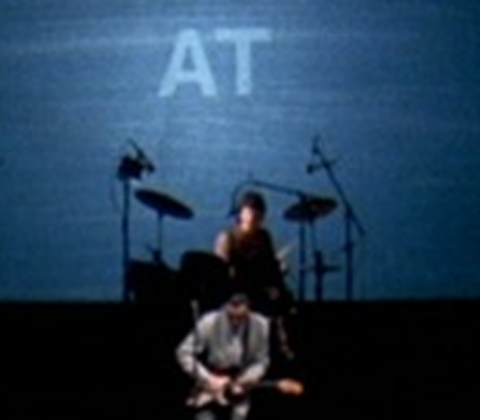
Stop Making Sense – The Babydance
This ain’t no party, this ain’t no disco, this ain’t no fooling around!
It wasn’t long after bringing our baby daughter home that we realized she needed a lot of attention. As new parents, we thought we were prepared for how much work a newborn would be. But was this… normal? She seemed to only be content when being held, walked, rocked, or all three at once. She would fall asleep in my arms, but suddenly jolt awake, crying, as soon as she was placed in her crib.
The word “colic” started getting thrown around, first by experienced parents, and then by her pediatrician. I think the formal, medical definition of “colic” is “an evil spirit in your baby whose purpose is to systematically test every bit of your mental and physical endurance and make you realize that you may never have another moment of peace in your life, unless you are holding and walking with the equivalent of a sack of potatoes in your arms.” That may not be exactly right (I’m no doctor) but I think it’s close.
I pictured myself at 70 years old, carrying my 42 year old daughter around so she wouldn’t cry.
As a new dad, I was very appreciative of more experienced parents sharing their opinions and advice with me. Until I wasn’t. I knew I didn’t know anything, but I became convinced that even parents with many children didn’t know anything either. It was as if I was wearing a sign that said “Give me unsolicited advice about parenting that does not work in my situation.” So, we had a lot of opinions. “Don’t pick her up every time she cries, you’ll spoil her and she’ll never stop!” I pictured myself at 70 years old, carrying my 42 year old daughter around so she wouldn’t cry. Or, “Of course you should hold her when she cries, she needs comfort!” “Is she hungry? Does she need to burp or poop? Is it just gas?” Yes, all the normal things were accounted for. She was colicky. This isn’t a medical blog, so I’ll let you Google (or not) the theories about colic. But whatever was going on, one thing was obvious: she stopped crying, and even fell asleep when I held her and walked with her.
Her favorite location for these walks was the dining room. It was a large room, decorated in somewhat gaudy Victorian style, suitable to the age of the house. The wallpaper was very busy, and the walls were adorned with various shiny, gaudy decorations: sconces, mirrored shelves, pictures framed in gold leaf. Walking in circles around the dining table, she would watch the gaudy scenery pass by. It had a hypnotic effect. Her eyes would grow heavy and she’d fall asleep. I’d wait a while before putting her in her crib. About half the time she’d immediately re-awaken, and the routine would start again. This happened numerous times, day or night. I also learned to eat my meals one-handed while holding her and rocking or standing by the table.
Holding/rocking/walking with your baby girl is a sweet, special thing. No question. It’s also very boring. So I started playing music. One of my favorite albums then and now is Stop Making Sense by Talking Heads, the live recording that complements the excellent concert film of the same name. I’d put the CD into my stereo (or my Sony Discman if I didn’t want to disturb others) and carry her around the house walk-dancing to the infectious, joyous beat. Sure, there’s some incongruity while dancing with my innocent baby to the opening number Psycho Killer, or the allusions to nuclear annihilation in Burning Down the House or Swamp. But, to quote a cliche that will be familiar to those of us of a certain age: “It’s got a good beat and you can dance to it.”
At some point, seemingly hundreds of years later, the colic subsided. She was no longer miserable when not being held. But I was somewhat miserable when not holding her. Cranking up Stop Making Sense and dancing around the house became a regular occurrence. A ritual. A habit. Maybe even a sacrament. As she got older, she would mimic the hand motions I had unconsciously added to the “dance” routine. As she learned to walk, she’d come up to me, holding both arms in the air to be picked up. I knew she wanted the music. As she learned to talk, she’d reach up and say “Dancing! Dancing!” And she’d sing along, correct lyrics be damned. It was always Stop Making Sense.

She never became “too big to hold” and now at 33 is still probably light enough. At some point the holding lessened, but the dancing continued. Sometimes it migrated to the car when I drove her to school. When she was about 9 or 10, the home video version of Stop Making Sense was released. We’d play it on the big 27 inch tube television and try to keep up with David Byrne’s frenetic movements. Try it some day. It’s quite a workout!
One of the highlights of the concert film is the song Life During Wartime, during which David Byrne dances as if he’s made of rubber, jogs in place to the beat, then breaks out into a full-out run, doing several laps around the rest of the band. I always feel better about my lack of dancing skill when I watch David Byrne. Odd movements, jogging in place, falling down, running, looking goofy… these are all things I can do! The chorus of Life During Wartime contains the well-known refrain “This ain’t no party, this ain’t no disco, this ain’t no foolin’ around!”
Those words might seem to be a perfect description of parenthood. Except sometimes it is kind of a party, and kind of a disco, if you want it to be.
My now-grown daughter bears a tattoo on her arm, one of over a dozen, with those lyrics. Now, that ain’t no foolin’ around!


The Futility of Protectiveness
As soon as my daughter was born I was overwhelmed with the feeling of wanting to keep her safe. Every object seemed a potential hazard, every situation a possible threat. Even our baby-proofed house never seemed quite baby-proofed enough. As she learned to crawl, the lurking dangers seemed even more unpredictable, and once she was walking the world seemed full of sharp objects at exactly toddler-head height.
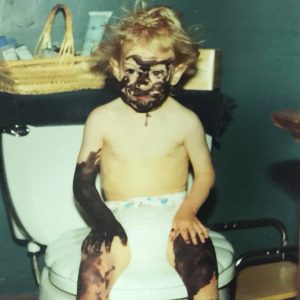 Having no siblings, she was quite content to play on her own when she tired of mom and dad. She was creative, so she would patiently draw, color, sculpt, or build. But any parent knows that even though it’s nice when your child is quiet, danger lurks when they are too quiet for too long.
Having no siblings, she was quite content to play on her own when she tired of mom and dad. She was creative, so she would patiently draw, color, sculpt, or build. But any parent knows that even though it’s nice when your child is quiet, danger lurks when they are too quiet for too long.
Such was the case in the accompanying photograph. Her child-safe crayons and markers were just not doing it for her, so she found a black, permanent magic marker to draw with. And, let’s face it, drawing on paper just isn’t that interesting once you’re over a year old. That’s for babies! So why not see how this thing works on flesh. Turns out, it works great!
When I discovered her “creation” I gasped, then slightly panicked, then laughed. I was relieved she didn’t get into something that was actually harmful, and felt guilty that I could leave her unsupervised long enough to cover half of her limbs and face with permanent ink. I snapped this picture just before putting her in the tub. Besides soap and water, we also tried peanut butter, vegetable oil, and various other gentle concoctions to try and remove the ink. This happened pre world wide web, so I couldn’t just Google for possible solutions.
The best we could do was turn the black stained skin to purple-blue. For the next couple weeks, any public appearance was met with suspicious glances, and sometimes questions, as people saw what appeared to be a sweet two year old covered in massive bruises. Long pants and long-sleeved shirts helped, but I thought making her wear a ski mask or balaclava would have presented a whole new set of questions. I half-expected an anonymous tip would result in a visit from Child Protective Services.
A couple years later, she was playing in her plastic playhouse in the back yard as I did dishes and other tasks in the house. She was never out of sight, as the kitchen and office both had generous windows and doors that opened onto the back deck. She would happily bounce into the house and grab a toy or stuffed animal, and bounce back out to the playhouse. As the playhouse wasn’t enclosed, she was never out of my sight. Or so I thought.
I sat down in the office to take a breath and looked out to see her happily coming back into the house, I thought to grab another favorite toy. Instead she was bringing me something.
“Here, Daddy!” she said. I put out my hand and she dropped a handful of fine, curly hair into it, then dropped a pair of scissors on top.
“Here, Daddy!” she said. I put out my hand and she dropped a handful of fine, curly hair into it, then dropped a pair of scissors on top. I stared at the curly locks, trying to figure out which of her stuffed animals she had shorn. And when did she sneak scissors out there? When I looked at her face, it seemed much rounder than usual, her forehead much more prominent. I was holding her bangs in my hand. She had chopped her own hair right down to the scalp.
The familiar gasp/panic/laughter/guilt cycle engaged once again. Her mother wasn’t home at the time, so my panic and guilt was compounded by knowing I had to explain how I could have been so inattentive. Fortunately, after her mom’s initial panic subsided, I managed to circumvent any over-reaction by asking, “How old were you when you first chopped your hair off?” She answered, “Four.” We were both able to just take it in stride. It would grow out.
I don’t want it to sound like every crisis ended up being harmless.
There was the split lip at five from when she decided to stand on the bathroom sink and try to look over the top of the shower curtain to see how the bathtub looked from an aerial view. She didn’t understand that a shower curtain rod was only meant to support the weight of a shower curtain, and not an entire kindergartner. She tumbled headlong into the tub resulting in a massive wound to her lower lip. Despite immediate medical attention, it got dangerously infected, resulting in a multiple day hospital stay and a scar and slight deformity she bears to this day.
Then there was the leap she took from her swing set, straight into a low hanging branch, a small portion of which punctured her scalp, necessitating another ER visit. There was another split lip when she misjudged a leap on her monkey bars. A broken finger when a friend accidentally stepped on it. Uncountable scrapes, cuts, bruises, contusions, and a bee sting. Not to mention non-injury ailments and health issues, some of which she wrestles with to this day.
When she started going out with friends or on dates as a teenager, I couldn’t help but worry about her until she got home. But somehow she survived, graduated from high school, and went off to college.
Much has already been said about how American parents are now more protective than ever. I was raised in one of the roughest areas of Detroit, and my siblings and I were out of sight of our parents for hours at a time, our only restrictions being to be careful and be home in time for dinner. Yet in the very safe Montana neighborhood I raised my daughter in, I wanted eyes on her at all times. When she was a teenager, I made sure she had a cell phone with her whenever she left home. Of course we should be vigilant to protect our children, but we can’t have total control and protect them from everything all the time. But we have every right to worry about them.
After she graduated from high school, she went to the University of Montana in Missoula, about a five hour drive from Billings. On our visit there for orientation, she sat in the common area to look over some of the material. I stepped away to look around, and when I came back I took the photograph below. I couldn’t help but feel the scene was a metaphor for my feelings at that moment. She’s a tiny girl, just a child in my eyes, in danger of being overwhelmed by the world around her. The points of the greenery seemed to be daggers and arrows aimed in her direction. But she was oblivious and unconcerned, going about her business of growing up.
She doesn’t color her own skin anymore, but pays others to do it in the form of tattoos. She doesn’t randomly cut off her bangs to the scalp any more, but she buzz cuts the sides, and colors it a bright green. And when she is quiet and alone, she’s usually creating hand-painted and digital art.
I’m glad her technique is more refined now, and it makes me feel slightly less guilty for my moments of inattention. Every artist needs freedom to experiment.

My daughter at University of Montana during orientation

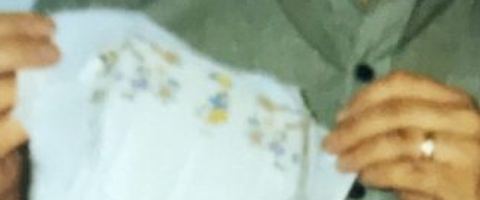
Welcome to Diaperville; Population: Poo
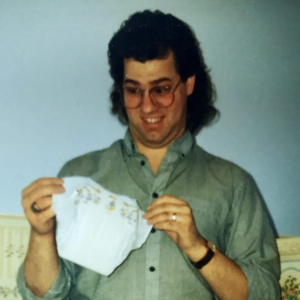
1990. And I still had a mullet.
…something happened that made me actually look forward to changing diapers
I’ve never liked talking about bathroom stuff. I rarely even like jokes about it, and I don’t even like euphemistic references to it, unless you are my doctor and I’m dying of dysentery. I’m going to overcome my poopaphobia for the purpose of this blog entry, because, as any parent knows, as soon as you have a baby, dealing with poop overtakes almost everything else in your life.
As I mentioned in my first entry to this blog, I was pretty sure I could do anything a good dad should do, but I was totally seriously incredibly not looking forward to diaper duty. Or diaper dooty. But(t), I knew I had to just put on my big boy pull-ups and do it.
Movies and TV shows get a lot of comic mileage out of the idiot dad who can’t even figure out a diaper! In fairness, whether right or wrong, and for whatever reason, girls are more likely to be taught baby-care duties than boys. Thankfully that is changing, but we have a long way to go. But for now, the mom having more experience than the dad is not a surprising thing. But having no experience doesn’t automatically mean idiocy. All that to say, even though I had never changed a diaper before having my daughter, I don’t remember any learning curve to it. Maybe if we used cloth diapers and pins, I would have needed some tutoring, but disposable diapers with tape are obvious by design.
So, after a week or so, I became totally desensitized to diaper changing. I always tried to be discreet in public (this was before most public men’s rooms had “changing stations”) but in general, it was just no big deal. It was so routine in the first months that it became, in a word, boring. But then something happened that made me actually look forward to changing diapers. It’s a weird thing thing to say, I know, but it’s true. Something clicked and I realized that this was part of the bonding experience with my baby daughter. As she grew from a newborn to an infant, she would react to different stages of the diaper-changing process:
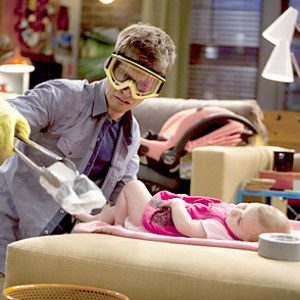
A scene from the documentary Mr. Mom.
- Poopy-diaper crying
- Getting cleaned off relief
- Rush-of-air on freshly baby-wiped butt surprise
- Naked-freedom thrashing, and finally
- Fresh-diaper contentment.
Babies start to intentionally smile and laugh at between three and six months. Once that milestone was hit, diaper-changing time became a blast! I realized I could make her laugh during the stinky process, and seeing her laugh made me laugh. Just making exaggerated stinky faces and yelling “stinky baby!” (only at home of course) would always get a reaction.
Then I discovered something that would change the course of diaperdom for all time. I saw that by wearing the clean diaper on my head while removing the dirty one was a real baby-pleaser! This became my signature move, and the foundation for pee-and-poop-related hilarity that would last for years of diaper changes. As my baby daughter’s language and understanding increased, so my diaper-on-the-head routine took on more layers of hilarious sophistication.
“Oh nooooooooo!” I’d fake-yell with the new diaper on my head, “Where’s the clean diaper??!?! I can’t find it anywhere!!!!!” She would laugh at my antics, even before she understood what I was saying. Then, when she began talking and understanding she would begin responding to my “missing diaper” panic by pointing at it and yelling “There!” I’d pretend like I didn’t understand where she was pointing and look behind me as she protested, “There! Head!”
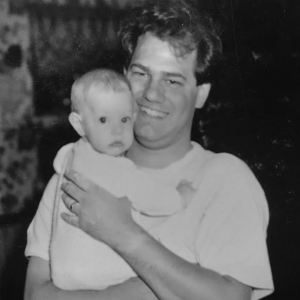
Our skit took on another dimension once she could walk. With my diaper hat in place, her bottom cleaned and dirty diaper safely aside, I’d feign panic at the “lost” new diaper and yell “Oh no! Naked baby and no clean diaper!” If you know anything about one year old naked babies, then you know there is nothing they like better than to run around the house, feeling the breeze on on their naked babiness.
She would tear through the house, laughing, screaming, and giggling as I chased her around, diaper on my head, letting her stay just out of reach until one of us (me) was too tired to continue the game and we got back to the very serious business of diaper installation.
Parenthood requires doing things we just don’t like to do. Diaper changing is usually considered one of them. However, the necessary but unpleasant tasks are not an interruption of your life; as a parent, they are your life. It makes sense to try and look for ways to make the most out of every interaction with your child. Even the poopy ones.
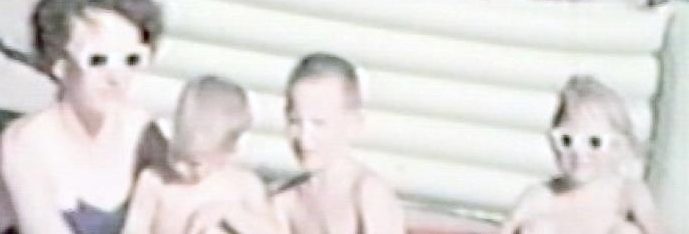
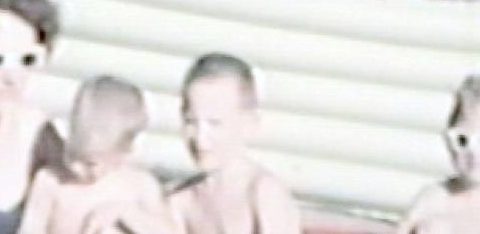
We’re Only Tourists in This Life – Generations and Legacy
“We’re only tourists in this life / Only tourists but the view is nice”
– Everybody’s Coming to My House, David Byrne

Mom settled into the assisted living home with her beloved Diet Pepsi
It’s appropriate that I heard David Byrne’s new song, quoted above, just as I was contemplating writing this entry. In my previous entry, I talked about how important his music was in raising my own daughter. His new song resonated with me due to my mom’s failing health due to Alzheimer’s. This is also why posting a new blog entry has been delayed so long.
I’ve spent the last few weeks getting her settled into an assisted living facility. She’s 82 years old, has suffered from Alzheimer’s for at least the last ten years, and is now in the end stage of the disease. It has been a slow-moving steamroller that is now accelerating down a steep hill. Ron, her husband of 20 years, has been a loving caregiver and partner, but the time comes when it’s simply not in anyone’s best interest to try and keep someone in her condition at home.
A word of warning to anyone who might have to deal with this: in addition to the obvious emotional toll, there are tons of meetings and paperwork involved! It was a bit frustrating that at the time when I felt she needed me at her side the most, I couldn’t be there because I had to meet with doctors, nurses, social workers, nursing home coordinators, bankers, and hospice workers. I can’t even begin to guess how many papers I’ve signed during the last few weeks.
There’s a larger to story to be told about all of this, but I want to focus on just one aspect. Alzheimer’s destroys the brain, eroding memory. My mom doesn’t recognize me or her husband without being reminded, and even then it slips away quickly. She doesn’t remember what has happened just a minute ago, and doesn’t worry about what will happen next. She truly lives in the moment.
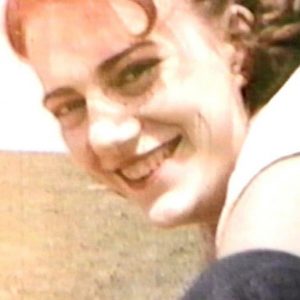
Mom at about 24. A still frame from a home movie, about 1960.
However, in those moments she is almost always happy and content. This is the personality I have seen demonstrated over the years. She loves everyone she meets and always has a word of encouragement. In my last visit, an aide had just helped her in the bathroom and was getting her settled in her recliner. “It’s so nice to be here with you!” she told the aide. By this time, she didn’t know where she had just come from, or really who the aide was. “You make this place such a nice place to be!”
Another time, a hospice worker had just left her room and said, “Your mom is so sweet! As I was leaving she yelled out ‘Keep your happy!'” Certainly the turn of phrase was odd due to the disease, but the sentiment was obvious. She wrote it down in her visitation notes.
There’s no way to know how much longer mom will live, but by any measure, it’s not long. It’s sad to see her succumb to this disease. But it also makes me want be better about living in the moment myself. I can do better at enjoying the here and now without unduly worrying about the future or holding on to the past. There’s a cheesy saying, appropriate for a bumper sticker or embroidered pillow: “Yesterday is history. Tomorrow is a mystery. Today is a gift. That’s why it’s called the present.” Its cheesiness doesn’t make it any less true.
You never know how Alzheimer’s will affect someone’s personality. Some people become mean and even violent. In my mom’s case it has so far stripped away everything aside from her true essence of kindness and acceptance and love. Hopefully the positive traits will continue until she succumbs; I have no reason to expect otherwise.
The death, past or impending, of a parent can’t help but make us think about our own mortality and legacy. Hopefully we can all do a little better than our parents did. Since my daughter has long ago flown the coop and gotten married, I’m done raising her. But in the same way my mom still influences me today, without even knowing it, I’m aware that I still influence my daughter. When she was living with me, my influence was deliberate. Now, unless it’s in response to her asking for advice, any influence I have is accidental.
I just hope most of my influence is in the form of characteristics she wants to emulate, not ones she wants to avoid.

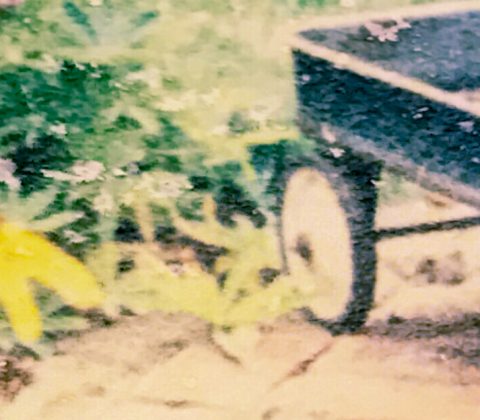
Fatherhood, Day 1: “I Can Do This!”
When my (now ex) wife was pregnant with our daughter, I was overwhelmed by the thought of being a dad. My own dad was, to be mild, not that great at the job. The only thing I knew about being a “good dad” was that I had to be better at it than he was.
I was 28, but my brain still felt like I was a teenager. How could I be allowed to be a dad? Surely I had to pass a test, or get a license, or something. But no. The famous quote from the movie Parenthood came to mind: “…you need a license to buy a dog, or drive a car. Hell, you need a license to catch a fish! But they’ll let any butt-reaming asshole be a father.” While I was pretty sure I wasn’t an asshole, I wasn’t sure I had what it took to be a good dad, which is much different than just not being a bad one.
I worried about affording it, of course, as do most other dads-to-be. But other than that, I didn’t worry about The Big Things. I mean, I knew I wouldn’t put her in jeopardy, be careless, abusive, or neglectful. Instead I worried about the smaller things.
I had never changed a diaper, and the thought of it, frankly, disgusted me.
Although the diaper issue was my top insignificant worry, there seemed to be hundreds of other worries zipping through my mind at any moment. Being responsible for another life can seem overwhelming. And that overwhelming feeling was never so strong as the day my wife went into labor. We knew not to go to the hospital too soon, a common mistake, we were told. Since we lived only a mile from the hospital, we were confident we could ride out the labor at home until the point of no return. The doctor had told us the magic number was three. When contractions were three minutes apart, get to the hospital. That happened at about 11 o’clock one morning in March. So off we went.
Reading between the lines, I understood that if things didn’t go right, bad things could happen. I never felt so helpless in my life.
A little after 7 pm, after 8 hours in the hospital, the baby was born. I’ve referred to her already as our daughter, but we didn’t know beforehand what she would be. I secretly really wanted a little girl. So I was thrilled when I saw I had a daughter. I yelled out in my excitement, “It’s a girl!” Then I realized that in my excitement I may have not seen things accurately before she was bundled up. So I looked at the nurse and asked “It is a girl isn’t it?” The nurse laughed and said “Yes, it’s a girl!” Then the nurse turned the bundled baby’s face toward mine, pointed to the dimple in her chin and said “We know where this came from!” Indeed I have a prominent “chimple” that was now mirrored on my daughter’s face. She handed me the delicate bundle. My daughter weighed not even seven pounds, and I was surprised how light she was. She was tiny but perfect.
I handed her to her mother. Due to the drama surrounding the delivery, she hadn’t been given anything for pain, but didn’t complain. Exhausted, she held our daughter as I looked at them and tried to let my brain process the reality of the situation. Here it was. Not an ultrasound anymore, not a pregnancy, not a theory, but a real live, actual, new, whole person I was responsible for.
I can’t explain why, but instead of being overwhelmed, all my dad-related worries suddenly fell away like a great weight from my shoulders. I looked at my swaddled daughter, and thought, as clear as if I were speaking it out loud, “I can do this! I’m going to be a great dad!”
But I still hadn’t changed a diaper yet.
